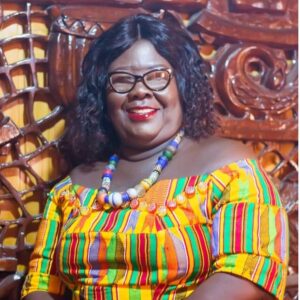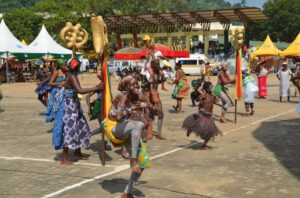The 2022 edition of the National Festival of Arts and Culture (NAFAC) is ready to roll, and it promises to be an unforgettable week-long celebration of national arts, artifacts and cultural extravaganzas, according to National Commission on Culture (NCC).
Madam Janet Edna Nyame, Executive Director, National Commission on Culture told the B&FT tourism desk scouts in an exclusive interview at the Central Regional Centre of National Culture to access the state of the preparedness of NCC and its stakeholders for NAFAC 2022.
Madam Nyame told the tourism scouts that the NAFAC Planning Committee and the regional teams have spent time and energy to meticulously plan a memorable NAFAC 2022, including the various regional NAFAC celebrations across the regions, and are well-prepared for a grand and a memorable NAFAC.
Opening
NAFAC 2022 commences today at the Central Regional Centre of National Culture in Cape Coast.
Guest of Honour
President Nana Addo Dankwa Akufo Addo is billed as the Special Guest of Honour at NAFAC 2022.
All roads lead to Cape Coast 9th – 16th December
The National Commission on Culture (NCC) is a statutory body created with the responsibility of overseeing the culture of Ghana as well as everything associated with it under the PNDCL 1990, 238. NCC is the statutory corporate body has the mandate to holistically promote, regulate and control the cultural life of the Ghanaian society. As such, NCC is the national agency responsible for managing and couching out the overall cultural perspective and culture life of Ghana.
As captured in Ghana’s Cultural Policy, among other functions, NCC is obliged to “enhance Ghanaian cultural life and develop cultural programmes to contribute to the nation’s human development and material progress through heritage preservation, conservation, promotion and the use of traditional and modern arts and crafts to create wealth and alleviate poverty”. Also, the NCC is to “foster national unity among the diverse ethnic groups of Ghana by promoting cultural interaction and inter-ethnic understanding through programmes that create an enabling environment for national development”.
NAFAC @ 60
In light of these policy directions, the commission, in 1961, instituted the National Festival of Arts & Culture; and has since been organising this grand event to fulfill the constitutional responsibility placed on this institution.

The National Festival of Arts & Culture (NAFAC) has firmly assumed its rightful place in the scheme of national events and activities as vehicles that celebrate Ghana’s diverse ethnic and tribal customary and cultural groups, practices and value systems, which make up, define and identify us as Ghanaians.
The theme for the 60th NAFAC anniversary and 2022 edition is ‘Reviving Patriotism, Peace and Unity through Cultural Diversity for Sustainable Development’. It is said: “A nation which does not honour its heroes is not worth dying for”. Tracing the historical antecedents of the National Festival of Arts and Culture (NAFAC) to the late Dr. Alexander Atta Yaw Kyerematen (the Founder and the First Director of the Ghana National Cultural Centre, now the Centre for National Culture (CNC), Kumasi) obviously reveals that the meaning of our theme for NAFAC 2022 celebration is outstanding in several senses. In that, this year’s edition – aside from the usual display and exhibition of rare cultural pomp and pageantry – will lay the necessary stepping stone for greater future celebrations as has become synonymous to this event. NAFAC 2022, moreover, marks the sixtieth (60th) anniversary of the novelty national cultural cash-cow festival.
The celebrations are scheduled from 9th to 16th December, 2022 at the Central Regional Centre for National Culture (CNC) at Cape Coast, the historic Central Regional Capital, which was also the Gold Coast’s first capital from 1844 until 1877, when the capital was relocated to Accra – indeed encapsulated in wisdom. Many nations of the world have developed to where they are today because of the sacrifices, selflessness and patriotism exhibited by certain individuals or group of citizens having an allegiance to such nations.
No doubt one of the surest ways to instill and revive the spirit of patriotism in the citizens of a country is to celebrate and honour the achievements of its heroes. However, one may ask: “What is patriotism?” The standard dictionary definition of the term reads: “Love of one’s country” which, of course, explains the core meaning of the term. In a philosophical study of the term, however, Stephen Nathanson defines patriotism as involving: (a) special affection for one’s own country, (b) a sense of personal identification with the country, (c) special concern for the well-being of the country, and (d) willingness to sacrifice to promote the country’s good. Thus, patriotism in this sense is seen as “a natural and appropriate expression of attachment to the country in which we were born and raised, and of gratitude for the benefits of life on its soil, among its people, and under its laws”.
As a virtue and an important component of our identity, patriotism can be regarded as an embodiment of such moral values as love for peace, unity, equality and, of course, a sense of loyalty to one’s nation. Patriotism can bring a country together around the highest ideals of love for peace, unity and equality. It is, thus, a central and ennobling disposition that societies cannot afford to do without because it holds the key to our respect and recognition for our individual diversity. In this regard, seeking to revive the culture of patriotism among the citizens of a country while promoting peace and unity through cultural diversity is undoubtedly one of the promising ways nations can use to sustainably develop.
The concept of cultural diversity has been extensively espoused by several authors; but in simple terms, it has been explained as a situation of the society in which there is equal opportunity and no one is discriminated against because of their differences. In summary, it is a more equitable society in which all people are welcomed, accepted and respected simply because they are human. Even though today there is a consensus that each person is different, it still remains very difficult for people to recognise that difference. In fact, there are an infinite number of distinctions for the term ‘diversity.’ Examples include cultural diversity, ethnic, linguistic, biological, sexual, functional diversities, and others.
The NAFAC experience
The NAFAC encourages everyone to appreciate art and explore the diverse cultures around us. It is the largest celebration of arts and culture in Ghana. This celebration urges everyone to reflect on how art enriches our lives from music to literature, paintings to photography and theatre (poetry, dance, drama).This programme brings to fore the understanding of art and culture as noble pursuits and necessary to sustain the life and development of the people.
This biennial event brings together organisations and communities across the country to celebrate their uniqueness. The week-long celebration covers the vastness of the diverse cultures practised across the nation. This is achieved by collaborating with the 16 Regional Centres for National Culture (CNC).
The celebration attracts a multitude of talents, artists, enthusiasts, performers, entertainers and others. Some participants discover and explore new dimensions of the arts and cultural expressions surrounding them while appreciating and incorporating these new discoveries into their art life. As the country’s largest celebration of the arts, the four goals of NAFAC are: 1) to create national, state and local focus on the arts, humanities and culture through the media 2) to encourage individual artists, cultural practitioners and other organisations nationwide to provide an opportunity for state, local businesses, government and civic leaders 3) to declare their support for the arts and humanities to establish a vehicle for raising public awareness about the arts and culture, and 4) to foster national development and transformation.
Programmes & activities
Cultural dance and drama performances: These will be led by the various groups from the Regional Centres for National Culture (CNC). There will be symposia, seminars and webinars – all targetted at artists and cultural workers. Tourists den and movie caves are key components of NAFAC, which offer an opportunity for visitors – from both home and abroad – to experience and understand Ghanaian culture. Children are neither left out nor discriminated in the NAFAC buzz; as a result NAFAC activities provide children’s Island dedicated to and seek to groom, educate and enlighten children with fun activities including storytelling sessions, body painting and traditional games.
Several art booths and stations at the NAFAC ground seek to offer opportunity for artists and artisans to showcase their works and art forms, which also open doors for visitors to express themselves as well participate in the different tutorials.
Benefits
NAFAC serves as a unique platform that exposes artists and cultural workers to a wider/global audience. NAFAC also provides a suitable platform for commerce, and additionally serves as a bridge between industry practitioners.

Miss NAFAC
While beauty pageants around the world are primarily about putting idealised versions of femininity on a competitive stage and awarding a royal title and crown to the winner, they are also about using femininity to represent other issues. As diverse as the issues confronting society goes, these contests highlight values, concepts and behaviours that are acceptable and give credence to their sense of self while exhibiting values of morality, gender equity, and place. Beauty queens can become symbols and agents of positive change within a given community or nation.
The Miss NAFAC Cultural Pageant, unlike many other pageants for women, is a leadership-based pageant. Moreover, the winner is not selected based on votes, it rather emphasises scholastic achievement, community involvement, public speaking and strong cultural values. Contestants are therefore expected to possess good human relations, speaking poise, composure as well as interview skills and other outstanding interpersonal qualities in order to be crowned Miss NAFAC.
Conclusion
NAFAC has rightly justified its inclusion, and has contributed in several ways to the development and growth of the creative and cultural sub-sectors, tourism and socio-economic development and transformation as a whole.
The National Festival of Arts and Culture (NAFAC) has become an important event among other indispensable events on the national cultural and tourism calendar, which has come to stay as a vehicle to uplift, reposition and celebrate artists, creative and cultural practitioners and their contribution to national socio-economic development and transformation.
NAFAC is a flagship programme of the National Commission on Culture (NCC) and its Centres for National Culture (CNC) –a corporate body and an implementation agency of the Ministry of Tourism, Arts and Culture (MOTAC).
60th NAFAC anniversary & venue
MOTAC, NCC and partners invite all and sundry to mark December 9th to 16th on their calendar and make sure all roads lead to the Central Regional Centre of National Culture in Cape Coast for NAFAC @60 and NAFAC 2022.
“A society without culture is doomed,” is a prominent African adage.
The writer is a Tourism, Brands & Branding, Communication & Marketing Consultant, Practitioner, Analyst, Advocate & Activist with contributions from Efua Apprey, Snr. Cultural Officer, Policy Planning, Research, Monitoring & Evaluation; and Ama Amponsah Painstil, Public Relations Officer, National Commission on Culture.
Email: [email protected]










